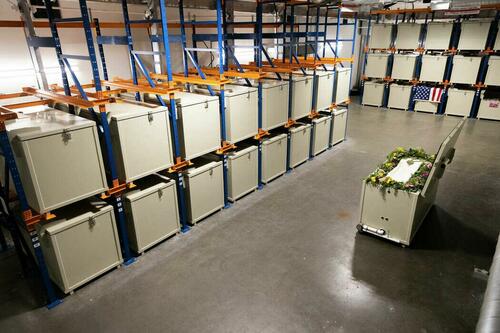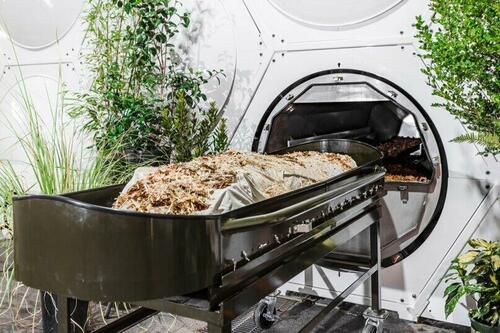
California is about to give people a third option for what to do with a body after death.

JASON REDMOND/AFP via Getty Images
Instead of just burial or cremation, the state will now allow people to choose human composting - or natural organic reduction (NOR) starting in 2027, after Gov. Gavin Newsom signed Assembly Bill 351 last week, according o SF Gate.
The process of composting a cadaver, already legalized in Washington, Colorado and Oregon, involves placing the body in a reusable container, surrounding it with wood chips and aerating it to let microbes and bacteria grow. After about a month, the remains will decompose and be fully transformed into soil. Companies such as Recompose in Washington offer the service at a natural organic reduction facility. -SF Gate
The process is considered 'green' - as it doesn't require the burning of fossil fuels and emission of carbon monoxide. According to National Geographic, cremations in the US alone emit around 360,000 metric tons of carbon dioxide per year.

And according to the author of the bill, Asemblymember Cristina Garcia (D), the threat of climate change motivated the new law, particularly after LA County suspended regulations on cremation emissions during the pandemic.
"AB 351 will provide an additional option for California residents that is more environmentally-friendly and gives them another choice for burial," Garcia said in a statement. "With climate change and sea-level rise as very real threats to our environment, this is an alternative method of final disposition that won’t contribute emissions into our atmosphere."
Garcia says she herself may elect NOR when she dies. "I look forward to continuing my legacy to fight for clean air by using my reduced remains to plant a tree."
The idea of composting human remains has raised some ethical questions. Colorado's version of the law dictates that the soil of multiple people cannot be combined without consent, the soil cannot be sold and it cannot be used to grow food for human consumption. The California bill bans the combining of multiple peoples' remains, unless they are family, but unlike Colorado, California is not explicitly banning the sale of the soil or its use growing food for human consumption.
The process has met opposition in California from the Catholic Church, which say the process "reduces the human body to simply a disposable commodity." -SF Gate
"NOR uses essentially the same process as a home gardening composting system," said the executive director of the California Catholic Conference, Kathleen Domingo, who noted that the process involved in NOR was developed for livestock, not humans.
"These methods of disposal were used to lessen the possibility of disease being transmitted by the dead carcass," she continued. "Using these same methods for the 'transformation' of human remains can create an unfortunate spiritual, emotional and psychological distancing from the deceased."
She added that the process, which may lead to human remains being scattered in public locations, "risks people treading over human remains without their knowledge while repeated dispersions in the same area are tantamount to a mass grave."
California is about to give people a third option for what to do with a body after death.

JASON REDMOND/AFP via Getty Images
Instead of just burial or cremation, the state will now allow people to choose human composting – or natural organic reduction (NOR) starting in 2027, after Gov. Gavin Newsom signed Assembly Bill 351 last week, according o SF Gate.
The process of composting a cadaver, already legalized in Washington, Colorado and Oregon, involves placing the body in a reusable container, surrounding it with wood chips and aerating it to let microbes and bacteria grow. After about a month, the remains will decompose and be fully transformed into soil. Companies such as Recompose in Washington offer the service at a natural organic reduction facility. -SF Gate
The process is considered ‘green’ – as it doesn’t require the burning of fossil fuels and emission of carbon monoxide. According to National Geographic, cremations in the US alone emit around 360,000 metric tons of carbon dioxide per year.

And according to the author of the bill, Asemblymember Cristina Garcia (D), the threat of climate change motivated the new law, particularly after LA County suspended regulations on cremation emissions during the pandemic.
“AB 351 will provide an additional option for California residents that is more environmentally-friendly and gives them another choice for burial,” Garcia said in a statement. “With climate change and sea-level rise as very real threats to our environment, this is an alternative method of final disposition that won’t contribute emissions into our atmosphere.”
Garcia says she herself may elect NOR when she dies. “I look forward to continuing my legacy to fight for clean air by using my reduced remains to plant a tree.”
The idea of composting human remains has raised some ethical questions. Colorado’s version of the law dictates that the soil of multiple people cannot be combined without consent, the soil cannot be sold and it cannot be used to grow food for human consumption. The California bill bans the combining of multiple peoples’ remains, unless they are family, but unlike Colorado, California is not explicitly banning the sale of the soil or its use growing food for human consumption.
The process has met opposition in California from the Catholic Church, which say the process “reduces the human body to simply a disposable commodity.” -SF Gate
“NOR uses essentially the same process as a home gardening composting system,” said the executive director of the California Catholic Conference, Kathleen Domingo, who noted that the process involved in NOR was developed for livestock, not humans.
[embedded content]
“These methods of disposal were used to lessen the possibility of disease being transmitted by the dead carcass,” she continued. “Using these same methods for the ‘transformation’ of human remains can create an unfortunate spiritual, emotional and psychological distancing from the deceased.”
She added that the process, which may lead to human remains being scattered in public locations, “risks people treading over human remains without their knowledge while repeated dispersions in the same area are tantamount to a mass grave.”





